Climate change
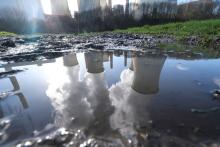
We can make radical change more quickly than we imagined. COVID-19 and climate change demand nothing less.
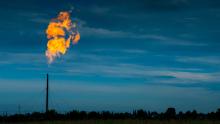
The religious community shares a moral responsibility to protect others from the harms of methane pollution and the devastation of climate change. it is our moral responsibility to act now. We must stand for the health of all humanity and work to limit methane pollution in our communities, especially among the most vulnerable.

Across the globe, women are on the front lines of protecting traditional and Indigenous land from threats like mining, ranching, and a range of other challenges – but they often struggle to have their own rights to these lands recognized and respected. But in some places, the church is stepping in.
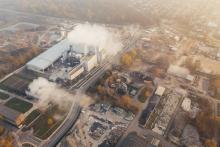
A report today released by the United Church of Christ identifies the nation’s “Toxic 100” super polluters, naming the factories and facilities responsible for nearly half the toxic air emissions in hundreds of neighborhoods across 28 states. Alongside the report, Breath to the People: Sacred Air and Toxic Pollution, the UCC provides an interactive map, because they believe parents have the right know where these polluters operate. Like toxic water, toxic air is irreversibly harming children across our nation.
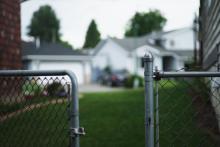
On-the-ground solutions to environmental challenges are becoming the most effective and practical strategy. Cities today are leading the way on climate resilience strategies, which are specific to the city’s infrastructural, geographic, spatial and topographic makeup, through initiatives like 100 Resilience Cities and Climate Ready programs, which help cities prepare for the long-term impacts of climate change.

Of course, dirt also tells stories of human triumph and transgression. With one scan from an X-ray fluorescence gun, you can tell whether a soil sample came from Cambridge or Dorchester, based on the amount of lead particulates present. A Ziploc bag full of dirt is also a history of redlining, white flight, and devastating arson, committed by property owners for whom the cost of maintaining the land surpassed the worth of those who called it home. Dirt is an archive of human attitudes toward the nonhuman world — our hubris in thinking ourselves separate from it, though we arose from it, and will inevitably return to it.

The past decade is almost certain to be the hottest on record, weather experts warned on Tuesday, painting a bleak picture of vanishing sea ice, devastating heatwaves, and encroaching seas in a report launched at a climate summit in Spain.
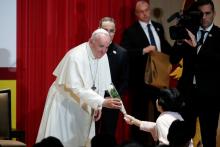
Pope Francis wrapped up a four-day trip to Japan on Tuesday by turning from the anti-nuclear message that was the backbone of his visit to other key campaigns of his, urging students to defend the earth and show greater compassion.
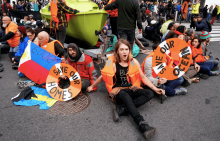
Being baptized at the Trafalgar Square protest site was not a publicity stunt for me. I had been Christened as a child, but still, receiving adult baptism was a choice I didn’t make lightly. I reaffirmed my baptismal vows at Extinction Rebellion because I needed God right beside me.
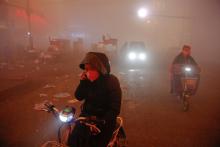
The Trump administration has formally notified the United Nations that it will withdraw the United States from the Paris Agreement, the first formal step in a one-year process to exit the global pact to fight climate change, U.S. Secretary of State Mike Pompeo confirmed on Monday.

How do we maintain hope when our earth is brutalized daily by the climate disasters brought on by human greed, denial, and consumption?
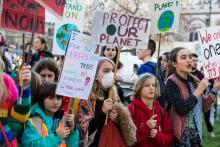
On Friday, Sept. 20, driven by our faith and by our profound concern about climate change, we will be joining young people from around the world in a climate strike. We will join with youth who, frightened by the impact that a hotter planet will have on their lives and angry that adults have done so little in response, are demanding that world leaders take transformative action to address the emergency that we face. Millions of us will take to the streets to demand a right to a future for generations to come.
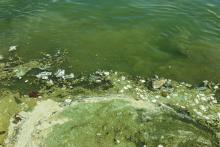
70 U.S. healthcare organizations endorsed a report about public health and climate change.
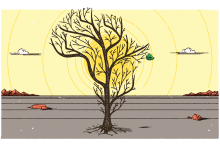
THIS YEAR, THE seasonal rains in Kenya came two months late. “Even the weatherman can’t forecast the weather,” Stephen Katama, a local shopkeeper in Nairobi, told me when I traveled to East Africa in June. “We can’t tell the difference between the summer and winter here anymore.”
During the past two decades, rain in sub-Saharan Africa has increased in frequency and intensity, creating dangerously erratic patterns of rainfall and drought. A single day’s downpour may bring the amount of rainfall normally expected over a period of eight months, wreaking havoc on the livelihoods of countless subsistence farming families across Kenya and Uganda.
Sub-Saharan Africa is among the regions projected to see the worst of climate change in the coming decades. I traveled with the Climate Witness Project, hosted by the Christian Reformed Church in the U.S., to Nakuru, Kenya, and North Teso and Soroti, Uganda, to visit farming communities facing extreme shifts in weather patterns.

Thousands of activists gathered in Detroit to perform mass demonstrations on Tuesday afternoon, just hours before the opening of the second presidential primary debate. The effort, spearheaded by Frontline Detroit, a coalition of organizations made up of members deeply impacted by pollution and environmental racism, produced demands for addressing the pervasive environmental and economic injustices that have plagued Detroiters for decades.
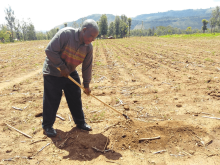
As the climate crisis intensifies and crystallizes, the tangible effects of climate change today are disproportionately dispersed on both the national and global scale. Communities and entire nations who do the least to contribute to rising greenhouse gas emissions bear the enormous burden of climate disaster first and worst on their bodies and their livelihoods.
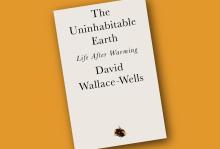
YET ANOTHER BOOK about climate change. What could it possibly say that we haven’t already heard?
Plenty, it turns out.
David Wallace-Wells’ extraordinary and chilling book The Uninhabitable Earth: Life After Warming gives an overview of the overwhelming scientific consensus that the planet is warming and changing at rates never seen before. But the real value for its readers are the 100 brutal pages of excruciating details about what life will be like if they do not quickly make extraordinary changes to their energy consumption. Wallace-Wells’ central message is that we are living in a time hotter than any other time humans have ever lived in, and we cannot go back in our lifetimes. And looking forward is nothing short of terrifying.
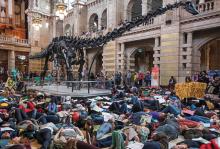
“FOR A LONG TIME, people were scared to talk about climate change in its stark reality because they thought people weren’t ready to hear that story. But after the Intergovernmental Panel on Climate Change issued its 2018 report laying out the situation we’re in with the climate, Extinction Rebellion started a movement to tell the truth and act as if that truth is real.

AS I WRITE THIS, I’m looking at images from the disastrous floods in the Midwest and in Mozambique. One is in the heartland of the planet’s richest country and the other on the edge of the poorest continent, but from the air they look a lot alike: waters spread across farmland and cityscape, humans huddled in shelters. They look, actually, “biblical,” to use the word that is sometimes employed to describe devastation on an immense scale.
Flood, of course, was God’s weapon of choice early on, when, pissed off at the general humanness of humans, he vowed to cleanse the earth. But he made an exception for the faithful Noah, and perhaps more important he made an exception for everything else on earth: In this early-on iteration of the Endangered Species Act, he made sure that a breeding pair of everything got on board the ark. And then, once the waters receded, he made the covenant with the surviving humans that guaranteed he would never flood the planet again.
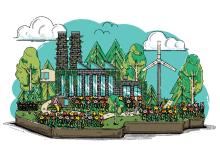
SOON AFTER SENATE Majority Leader Mitch McConnell brought the resolution for a Green New Deal to a sham procedural vote in March, a clip of its co-sponsor, Alexandria Ocasio-Cortez, went viral.
“You want to tell people that their concern and their desire for clean air and clean water is elitist? Tell that to the kids in the South Bronx which are suffering from the highest rates of childhood asthma in the country,” Ocasio-Cortez said. “Tell that to the families in Flint whose kids’ blood is ascending in lead levels.”
It was an illuminating statement. The Green New Deal had rapidly emerged on the heels of a report by the U.N. Intergovernmental Panel on Climate Change that puts the deadline for massive, coordinated action to avoid the worst of climate change at 12 years out. Now is the time for an audacious proposal of the kind climate activists have long pushed for, one that matches the planetary crisis in scale and scope.